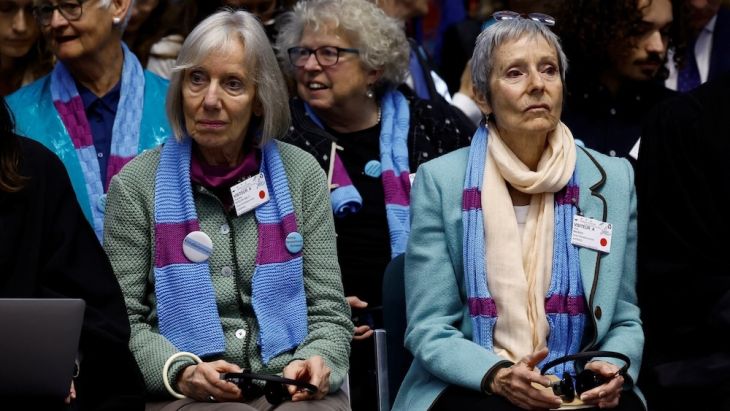In recent years, climate lawsuits have reached the top of the international legal system. Law professor Christina Voigt believes that we have only seen the beginning of a trend that could have significant implications.
Anne Mahrer and Rosmarie Wyder-Walti from the Swiss association KlimaSeniorinnen lost all court cases in Switzerland but won in Strasbourg. The judgment was the first to establish a direct link between climate and human rights.
In April, a group of elderly Swiss women achieved a historic victory in the European Court of Human Rights (ECtHR). They had sued their home country for not doing enough to protect them from climate change, and they feared the consequences of intense heatwaves.
They were supported by the ECtHR: the judgment stated that the Swiss government had violated their right to privacy and family life by failing to implement sufficient climate measures. It had therefore violated the claimants´ obligations under the European Convention on Human Rights (ECHR).
 Professor Christina Voigt´s research focuses on climate law and how climate change affects the legal system.
Professor Christina Voigt´s research focuses on climate law and how climate change affects the legal system.
Christina Voigt, professor of law and expert in international environmental law at the Faculty of Law, University of Oslo, was a so-called third-party intervener in the lawsuit: she had submitted a written, expert opinion that formed part of the background material for the judges.
"In the last decade, we have seen many climate cases in national courts in countries such as Germany, the Netherlands, the United States, Pakistan, and also Norway. What is new is that in the past two years, some cases have also bubbled up to international courts. Then, the states are told what to do by a supra-national judicial authority," says Voigt.
Lost in Switzerland, won in Strasbourg
The Swiss women had taken the case through all levels of the Swiss judicial system before taking it to the ECtHR in Strasbourg. They had consistently lost in Switzerland.
"Swiss politicians had made condescending statements in the media. When the judgment came, several were upset and thought the judgment was absurd. But now Switzerland must strengthen its climate goals and measures and report back to the court. Swiss courts will also have to take the judgment into account in later national court cases," says Voigt.
The judgment also has implications for the other member states of the Council of Europe, including Norway, which have all accepted the jurisdiction of the ECtHR.
For almost twenty years, Voigt has worked on climate law and how climate change affects the legal system. She conducts research on the subject and is a third party in several lawsuits. In addition, she leads the World Commission on Environmental Law (WCEL), a commission within the International Union for Conservation of Nature (IUCN): in that role, she also represents as lead legal counsel the IUCN as a party in major international legal climate cases, such as those at the International Court of Justice (ICJ) and the International Tribunal for the Law of the Sea (ITLOS), which on 21 May 2024 delivered its advisory opinion on states´ obligations under the law of the sea to address climate change.
Will follow the Paris Agreement
International courts must consider several international treaties and customary international law in their decisions. In a recent article in the journal RECIEL, Voigt writes that the international Paris Agreement of 2015 will likely also serve as a guideline in such legal cases. This especially applies to the ambitions outlined in each country's emission reduction plans.
"It is unlikely that an international court will demand more from states than what they have agreed to in the Paris Agreement."
"If the courts move beyond these frameworks, there is a risk of establishing parallel, or alternative, standards for climate actions. Additionally, it undermines the significance of the Paris Agreement, and the international legal system becomes even more fragmented than it is today, says Voigt."
Linking climate change to human rights
In the case of the Swiss women, the ECtHR did just that: The Court interpreted the ECHR in light of the Paris Agreement. The 250-page judgment is expected to be thoroughly read by academics and advocates in the months ahead.
This was the very first judgment that established a direct connection between climate change and human rights, by stating that a state that does not do enough to reduce climate change violates human rights.
"The ECtHR concluded that there had been a violation of human rights against these women: that the elderly are a vulnerable group, and that Switzerland could have done a lot more. For example, they have not set a carbon neutrality target for 2050, as several other countries have. Now the judgment states that this must be in place, and the country must create a concrete, progressive plan on how to get there."
A group of young people lost on the same day
The women stood out in this type of case because they are older. In many climate cases, it is young people who are the claimants. On the same day that the women won, a group of Portuguese children and young people lost a case against Portugal and 31 other states in the same court.
The group believed that they were particularly vulnerable to climate change because they were young. According to Voigt, to succeed with such a case, one must be particularly vulnerable.
"Another problem was that the case had not been processed in Portuguese courts first. The court saw the case as important but could not decide it since the claimants were required to take it through all levels of the Portuguese legal system before taking it to Strasbourg."
The business sector is also being taken to court
Christina Voigt says that we have only seen the beginning of a trend where the legal system is faced with this type of climate lawsuits. In national courts, there have already been a large number of cases, and once a case has succeeded in one country, similar cases are brought to courts all over the world.
"These cases spread like wildfire. There are many networks closely following and taking these cases further, for example, voluntary organizations like Greenpeace and ClientEarth."
In recent times, there have also been several cases filed against the business sector. Voigt describes this as a new wave of climate litigation.
"In many cases, it is not the states that are held responsible for greenhouse gas emissions, but private actors in oil and gas such as Shell, Total, British Petroleum, or major energy companies."
A Norwegian case is awaiting proceedings in Strasbourg
Norwegian actors can also not expect peace and calm in the years to come. A case awaiting proceedings in Strasbourg is against the Norwegian state, which in 2013 granted permission to open new oil fields. The plaintiffs, Greenpeace and Nature and Youth, argue that this is a violation of human rights.
"We'll see what the ECtHR says. If the court finds that Norway has violated its human rights obligations, it will likely request of Norway to change its legal practice or the country's legislation."
Voigt believes that what we have seen in the world's courts over the past seven years shows impatience in society. The Paris Agreement is a legally binding treaty, science is clear, but politicians are taking very small steps, she argues.
"Actually, it is the parliaments, such as the Stortinget here in Norway, that should set the requirements. According to the rule of law, if the legislative branch does not do what it is legally obligated to, the judicial part comes in to hold states accountable. I think we can expect that judicial bodies will have a more important role in the fight against climate change than we have seen in a long time."

















